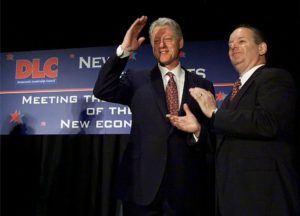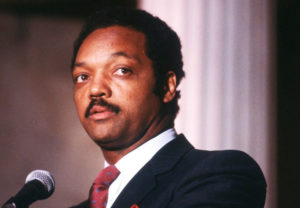————————————————————-
IV. The Politician, Part B
Stahl’s account, without addressing the internal machinations or intellectual history of Jackson’s work, displays how Jackson’s fellow Democrats abandoned him, and what he represented, in the Democratic Party. Jackson arises when Stahl considers the role of the Progressive Policy Institute, a center-left think thank created 1999 to feed ideas to the political arm that had led to its creation: the Democratic Leadership Council, founded in 1985 and headed by Alvin (Al) From, and later Bill Clinton. In light of the longer history of conservative think tanks, Stahl frames the PPI and DLC members against what they called “liberal fundamentalists.” According to DLC types, Jackson led those lefty ideologues who had supposedly captured the party apparatus during the 1980s. [1]
 This framing of Jackson occurred when, to Stahl, Democratic leadership accommodated itself to the “rising ascendant conservatism and the marketplace of ideas.” The latter was a device used by conservatives during the 1960s to 1980s to frame intellectual life as a perpetual competition, and to compel the liberal establishment to see conservatism as another identity that deserved a hearing for the sake of balance. By accommodating this new “identity,” Stahl argues, Democrats “moved the entire American political spectrum to the right.” [2]
This framing of Jackson occurred when, to Stahl, Democratic leadership accommodated itself to the “rising ascendant conservatism and the marketplace of ideas.” The latter was a device used by conservatives during the 1960s to 1980s to frame intellectual life as a perpetual competition, and to compel the liberal establishment to see conservatism as another identity that deserved a hearing for the sake of balance. By accommodating this new “identity,” Stahl argues, Democrats “moved the entire American political spectrum to the right.” [2]
Jackson represented the hitherto unchallenged view, since the New Deal, that the Democratic Party was built on coalitions of smaller constituencies. To Stahl, unity emerged from grassroots organizing around a progressive agenda. This was how Jackson ran his campaigns in 1984 and 1988. Al From’s “new” vision would be the exact opposite. The DLC and later the PPI would start with elites in party and in business—primarily Southern white men, no women—to organize “mainstream” or, eventually, “New Democrats.” These new Democratic politicians would define themselves against “special interests” and “single-issue interest groups” that had dominated party politics. This rhetorical move allowed the DLC to show how it could be friendly to business leaders. The Democrats were not hostage to social movements from the 1960s. By 1989 businesses were sponsors rather than merely another interest group. [3]
Against this new backdrop Jackson no longer appeared as a unifying, heroic CRM activist, but rather just another essentialist for African Americans. His interests, however he enabled them to coalesce with others, appeared to fracture the party. But Jackson tried to work with the DLC at first. Stahl records that at a 1987 DLC meeting Jackson offered an olive branch, rhetorically accompanied by the proverbially attendant dove: “The party has a progressive wing. It has a conservative wing. But it takes two wings to fly.” The party was a “family” with a diverse set of brothers and sisters: “environmentalists, women, American Indians, peace advocates, farmers, and many others.” [4]
The 1989 creation of the PPI, however, hardened the lines of difference. In exploring the PPI’s founding documents, it is clear that Jackson’s vision for the party was the “purest version of liberal fundamentalism.” In light of Dukakis’ 1988 defeat, the Democratic party must be rescued from social movement politics. That iteration of the party had been soft on crime and indifferent to victims, encouraging dependence with over-generous welfare policies, taxing in an out-of-control fashion, and embracing cultural and social values out of the mainstream. [5] Jackson was their chosen bogeyman.
Jackson, however, didn’t yet give up on the DLC. Because the DLC and PPI still recognized the erosion the middle class during the Reagan years, and called for more progressive tax policies, he still engaged New Democrats. He saw the power of their message, and realized he needed their backing. Stahl relays that Jackson addressed the DLC in 1990 with a speech, titled “Delighted to be United.” As reported in the Washington Post, therein he praised the DLC for “embracing his views on progressive taxation, military budget cuts and investments in education and economic development.” Stahl notes an ironic dig by Jackson, in the report, when the latter welcomed the DLC to the “new mainstream.” [6]

Bill Clinton and Al From, circa 2000. Credit: Picture found at Hollywood on the Potomac (March 29, 2016 post).
Here Stahl implicitly provides a sensibility for this new DLC creation. A New Democrat sought to forward middle-class values with the streamlined, highly-efficient, technologically savvy modern state. The “newness,” Stahl writes, “advance[d] a feeling of modernity–of being ahead of one’s time in understanding the world as is.” [8] The New Democrats were an elite vanguard that updated the Democratic party, bringing into being a business-friendly entity that could harness the market for American liberal ends—bringing together the European and American versions of liberalism. It was literally a neo-liberalism, though Stahl generally avoids the complications of that term. A newer deal–what From called “the new politics”—with American businesses superseded the old New Deal. And it was defined against Jackson as the “liberal fundamentalist” of grassroots and coalition-focused politics. This new vision literally excluded Jackson from future meetings of the DLC, beginning in 1991.[9]
That exclusion produced Jackson’s famous quip about the DLC being “the Mason-Dixoncrats.” As Stahl narrates the pivot, Jackson’s hostility undermined his coalition-building persona and “magnif[ied] the importance of the DLC and their new identity.”[10] Jackson became a non-factor in national political circles after this point.
 In leaving Jackson behind, New Democrats were free to characterize old liberalism as industrial-oriented, sluggish, bureaucratic, regulatory (notwithstanding Carter’s actions on that front), hierarchical, and inefficient. This new political sensibility traded on being cool, creative, and rebellious. Stahl calls it a “quasi-populist sensibility,” but it feels more to me like a political application of Thomas Frank’s Conquest of Cool—a “hip consumerism” in 1990s politics. [11] Was any president more cool, witty, and jazzy than Bill Clinton, in his day and context? He was something to behold, to be consumed by the political elites. In this way he foreshadowed the cool of the next New Democrat, Barack Obama.
In leaving Jackson behind, New Democrats were free to characterize old liberalism as industrial-oriented, sluggish, bureaucratic, regulatory (notwithstanding Carter’s actions on that front), hierarchical, and inefficient. This new political sensibility traded on being cool, creative, and rebellious. Stahl calls it a “quasi-populist sensibility,” but it feels more to me like a political application of Thomas Frank’s Conquest of Cool—a “hip consumerism” in 1990s politics. [11] Was any president more cool, witty, and jazzy than Bill Clinton, in his day and context? He was something to behold, to be consumed by the political elites. In this way he foreshadowed the cool of the next New Democrat, Barack Obama.
The last appearance of Jackson in Stahl’s text serves as the symbolic nail in the coffin of Jackson’s national political career: the Sister Souljah moment.[12] It was the final repudiation, delivered by Clinton, of Jackson’s lefty coalition. Social movement politics were dead to Democrats for the rest of the 1990s, and well into the twenty-first century.
Conclusions and Suggestions
What do we make of all this? I have five thoughts:
First, the drama of Jackson’s 1990-91 repudiation demonstrates that political accounts of the period must go through the thought, actions and community of discourse of Jesse Jackson. I feel the thesis of my four-part series stands. Any narrative that minimizes Jackson’s importance isn’t telling the truth about history.
Second, my cursory explorations did not uncover the intellectual influences of key colleagues from the SCLC, Chicago Theological Seminary, Operation Breadbasket, Operation PUSH, Rainbow Coalition, or Rainbow/PUSH Coalition. Those influences may reveal themselves in biographies and autobiographies that I did not have the time to explore for these posts.
Third, among recent historians, it seems only Stahl and Dan Rodgers have taken Jackson seriously. Rodgers analyzed his rhetoric, but even that analysis seemed to take Jackson’s words at face value, to bundle the rhetoric topically for a meta analysis. Stahl looks hard at Jackson as a unwilling and tragic political symbol within his own party. It was, to me, as if economic issues were coded “black” in the late “go-go” 1980s and then downgraded by Democratic party elites. More can be done, by future historians, on Jackson’s deeper ideological roots and sympathies. Were his sympathies that different from the DLC?
Fourth, a question: How have think tanks been coded and structured “white”? Who were the prominent African Americans, women, Latino/as, and other minority figures in “progressive” think tanks? How were their interests treated, or punted? When were “non-whites” brought in for think tanks topics?
Fifth, on my own biography and perceptions of Jackson: It seems a study of perceptions of Jackson, i.e. the caricature, is in order—if it hasn’t been done already. Perhaps one of our readers can enlighten me/us on this.
What say you? What more needs to be done? What other questions have arisen for you? – TL
————————————–
Notes
[1] Jason Stahl, Right Moves: The Conservative Think Tank in American Political Culture Since 1945 (University of North Carolina Press, 2016), 135-136, 141. Alvin From received the “Perlstein treatment” in the following: Rick Perlstein, “From & Friends,” The Nation, February 11, 2014.
[2] Stahl, 4, 125, 135.
[3] Stahl, 136-137, 139, 140, 143-144.
[4] Stahl, 141.
[5] Stahl, 142.
[6] Stahl, 143.
[7] Stahl, 143-144.
[8] Stahl, 144.
[9] Stahl, 145.
[10] Stahl, 146.
[11] Stahl, 146. See Thomas Frank, The Conquest of Cool: Business Culture, Counterculture, and the Rise of Hip Consumerism (Chicago: University of Chicago Press, 1997).
[12] Stahl, 152.


6 Thoughts on this Post
S-USIH Comment Policy
We ask that those who participate in the discussions generated in the Comments section do so with the same decorum as they would in any other academic setting or context. Since the USIH bloggers write under our real names, we would prefer that our commenters also identify themselves by their real name. As our primary goal is to stimulate and engage in fruitful and productive discussion, ad hominem attacks (personal or professional), unnecessary insults, and/or mean-spiritedness have no place in the USIH Blog’s Comments section. Therefore, we reserve the right to remove any comments that contain any of the above and/or are not intended to further the discussion of the topic of the post. We welcome suggestions for corrections to any of our posts. As the official blog of the Society of US Intellectual History, we hope to foster a diverse community of scholars and readers who engage with one another in discussions of US intellectual history, broadly understood.
First off, I wanted to say this was a wonderful series of posts. You’ve shown how important Jackson is to understanding recent American political and intellectual history.
As for this post, the conflict between the DLC and Jackson might be on of the most under-discussed political conflicts of the late 1980s. Of course, this can only be talked about if one takes Jackson and the Rainbow Coalition as a serious political force. Al From’s book, The New Democrats and the Return to Power, often frames Jackson as an adversary of the DLC: https://www.amazon.com/New-Democrats-Return-Power/dp/1137278641. If no one else takes Jackson seriously, he certainly seems to in that book by framing Clinton and the DLC against Jackson.
As for your questions, one that I’m particularly intrigued by is how “white” think tanks were. I know I’ve talked about this book on numerous occasions, but Derrick White’s book “The Challenge of Blackness” on the Institute of the Black World really delves into the difficulties of being a black-run think tank. There’s another think tank run by African Americans that is *conservative* in nature, but I can’t for the life of me remember the name of it. I’m not sure if it’s still around but it used to be an intriguing force in the 1970s and 1980s. Let me dig around and see if I can find the name of it.
From’s book was reviewed, I believe, in the Perlstein piece I link in the first note. Thanks for the references to the White and Riguer books. – TL
Alright, I believe this is it–the Lincoln Institute for Research and Education. I found a good mention of it in Leah Wright Rigueur’s book, “The Loneliness of the Black Republican.” Here’s something about it online: http://www.publiceye.org/magazine/v07n3/Blackcon-02.html
Was the Jackson/PPI/DLC maneuvering a separate track from the role of women in the Democratic Party during this time frame? I’m thinking about NOW, the teachers unions, Emily’s List etc.? And the middle 90’s saw a lot of Democratic women being elected to Congress–I’d guess that was a result of earlier work at local levels?
My sense, Bill, is that the (limited) rise of women in the Democratic party in the 1980s and 1990s was the result of independent work. I have no recollection of the DLC being described as a vigorous or special advocate for aspiring women politicians. – TL
So neither Jackson nor the DLC were important players, the women did it on their own.
(What else is new?) 🙂